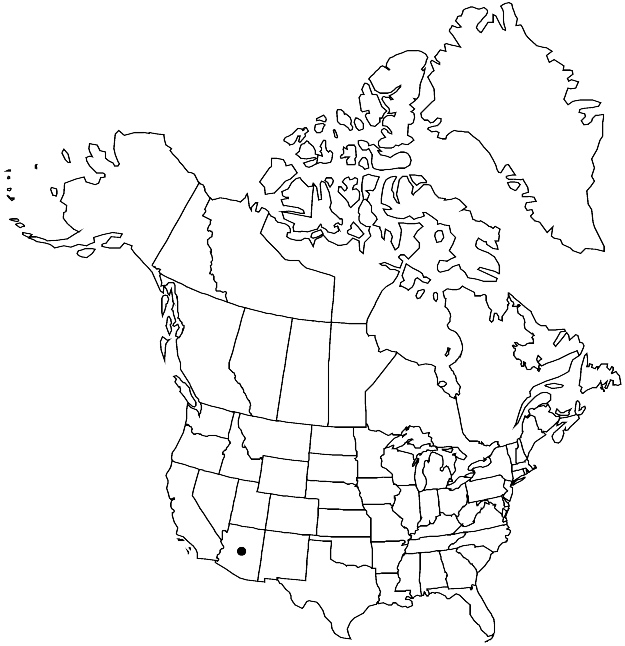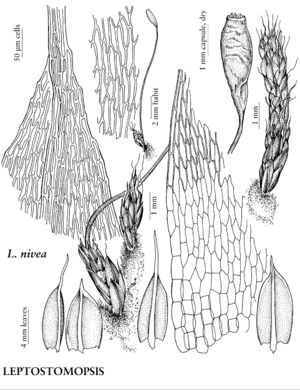Difference between revisions of "Leptostomopsis nivea"
Phytologia 91: 498. 2009.
FNA>Volume Importer |
imported>Volume Importer |
||
| (6 intermediate revisions by 2 users not shown) | |||
| Line 9: | Line 9: | ||
|special_status={{Treatment/ID/Special_status | |special_status={{Treatment/ID/Special_status | ||
|code=F | |code=F | ||
| − | |label= | + | |label=Illustrated |
}} | }} | ||
| − | |basionyms={{Treatment/ID/ | + | |basionyms={{Treatment/ID/Basionym |
|name=Brachymenium niveum | |name=Brachymenium niveum | ||
|authority=Bescherelle | |authority=Bescherelle | ||
| + | |rank=species | ||
| + | |publication_title=J. Bot. (Morot) | ||
| + | |publication_place=15: 383. 1901 | ||
}} | }} | ||
|synonyms= | |synonyms= | ||
| Line 29: | Line 32: | ||
|elevation=moderate elevations (1000-1200 m) | |elevation=moderate elevations (1000-1200 m) | ||
|distribution=Ariz.;Mexico;Central America. | |distribution=Ariz.;Mexico;Central America. | ||
| − | |discussion=<p>Leptostomopsis nivea was recently collected from two locations in southeastern Arizona, and the plants are very small for the species. One collection consisted of scattered plants in sandy calcareous soil along the edge of the Wilcox Playa, an unusual habitat for this species. This species occurs on trunks of trees or rarely on dry rock. It is reminiscent of Bryum argenteum, but the yellow cast, thick-walled, somewhat sinuate distal laminal cells, long awn, and serrate margins of the distal portions of the leaves easily distinguish this species.</p> | + | |discussion=<p><i>Leptostomopsis nivea</i> was recently collected from two locations in southeastern Arizona, and the plants are very small for the species. One collection consisted of scattered plants in sandy calcareous soil along the edge of the Wilcox Playa, an unusual habitat for this species. This species occurs on trunks of trees or rarely on dry rock. It is reminiscent of <i>Bryum argenteum</i>, but the yellow cast, thick-walled, somewhat sinuate distal laminal cells, long awn, and serrate margins of the distal portions of the leaves easily distinguish this species.</p> |
|tables= | |tables= | ||
|references= | |references= | ||
| Line 38: | Line 41: | ||
-->{{#Taxon: | -->{{#Taxon: | ||
name=Leptostomopsis nivea | name=Leptostomopsis nivea | ||
| − | |||
|authority=(Bescherelle) J. R. Spence | |authority=(Bescherelle) J. R. Spence | ||
|rank=species | |rank=species | ||
| Line 51: | Line 53: | ||
|publication title=Phytologia | |publication title=Phytologia | ||
|publication year=2009 | |publication year=2009 | ||
| − | |special status= | + | |special status=Illustrated |
| − | |source xml=https:// | + | |source xml=https://bitbucket.org/aafc-mbb/fna-data-curation/src/2e0870ddd59836b60bcf96646a41e87ea5a5943a/coarse_grained_fna_xml/V28/V28_236.xml |
|genus=Leptostomopsis | |genus=Leptostomopsis | ||
|species=Leptostomopsis nivea | |species=Leptostomopsis nivea | ||
Latest revision as of 21:34, 5 November 2020
Plants in dense cushions, turfs, or gregarious, pale yellow-silver. Stems 0.4–0.8 cm. Leaves erect to erect-spreading when moist, broadly ovate, somewhat concave, 0.2–1 mm; margins serrate near apex, limbidium present distally; apex acute, hyaline; costa long-excurrent, awn hyaline, straight to weakly recurved when dry; distal laminal cells hyaline, rhomboidal to almost vermicular, 30–40 µm, 4–6:1, walls thick, somewhat sinuate. [Capsule oblong, 2–3 mm; hypophysis slender, inconspicuous to somewhat well differentiated, sometimes expanded and rugose. Spores 20–23 µm].
Habitat: Dry volcanic rock, sandy soil, Madrean pine-oak woodlands in canyons, open playa edges
Elevation: moderate elevations (1000-1200 m)
Distribution

Ariz., Mexico, Central America.
Discussion
Leptostomopsis nivea was recently collected from two locations in southeastern Arizona, and the plants are very small for the species. One collection consisted of scattered plants in sandy calcareous soil along the edge of the Wilcox Playa, an unusual habitat for this species. This species occurs on trunks of trees or rarely on dry rock. It is reminiscent of Bryum argenteum, but the yellow cast, thick-walled, somewhat sinuate distal laminal cells, long awn, and serrate margins of the distal portions of the leaves easily distinguish this species.
Selected References
None.
